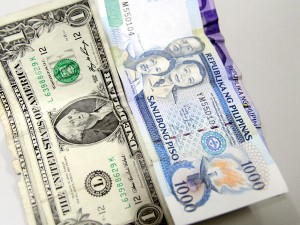
The Philippine government’s debt burden is poised to sustain its declining trend in 2014 and help further boost the country’s credit standing. PHOTO BY NOY MORCOSO/INQUIRER.net
MANILA, Philippines—The Philippine government’s debt burden is poised to sustain its declining trend in 2014 and help further boost the country’s credit standing.
The Department of Finance said in a report that, based on its latest projections, the proportion of the government’s outstanding liabilities to the country’s gross domestic product (GDP) would further fall to 47.4 percent next year.
By the end of the year, the debt-to-GDP ratio is expected to settle at 49.22 percent—the first time the ratio would end a fiscal year below the 50-percent benchmark.
Last year, the ratio stood at 51.5 percent.
According to international standards, a comfortable debt burden is one that is equivalent to or below 50 percent of an economy’s GDP.
The continuing decline in the debt burden was cited by international credit rating agencies as a key reason why the country attained an investment grade this year.
The government’s debt burden reached its peak in 2004 when it settled at 74 percent.
The Philippines secured an investment grade from all three major credit watchdogs—Fitch Ratings, Standard & Poor’s, and Moody’s Investors Service.
Fitch was the first to upgrade the country’s credit rating in March. S&P and Moody’s followed suit in May and October, respectively.
The drop in the debt burden was credited partly to the country’s growing economy.
Although the absolute amount of the debt has been rising, the increase has been outpaced by the economy’s expansion, which hit 7.6 percent in the first half of the year—the fastest in Asia during the period.
Rising tax collection also helped in keeping the budget deficit within manageable levels, the DOF said.
The Bureau of Internal Revenue, an attached agency of the DOF, has been tasked to implement administrative and legal measures to boost tax collection.
The BIR has been filing tax evasion cases every two weeks in an effort to discourage taxpayers from underdeclaring their incomes.
Earlier this year, the BIR also issued various tax regulations to plug loopholes in existing tax laws.
One example is the regulation requiring hospitals, health maintenance organizations, and clinics to withhold taxes of doctors and medical practitioners.
The regulation is seen to address tax evasion among medical practitioners, which the BIR suspected to be rampant.
Another example is a regulation stating the tax obligations of operators of privilege stores, or “tiangges,” to enforce tax compliance.
In raising the country’s investment rating, the credit agencies cited the government’s favorable fiscal position. The agencies also noted the country’s benign inflation, stable banking system, rise in foreign exchange reserves, and robust economic growth driven by strong domestic demand.
Last year, the BIR for the first time hit the P1-trillion mark in annual tax collection, generating P1.06 trillion.
This year, the BIR expects to post at least 10-percent growth in tax collection.
Also, the DOF tasked the tax bureau to breach the P2-trillion mark in annual tax collection by 2015, a goal revenue officials said was achievable.
The assignment of the higher collection goal was meant to reduce foregone revenue for the government—estimated at P450 billion a year, according to the World Bank—due to tax evasion.

